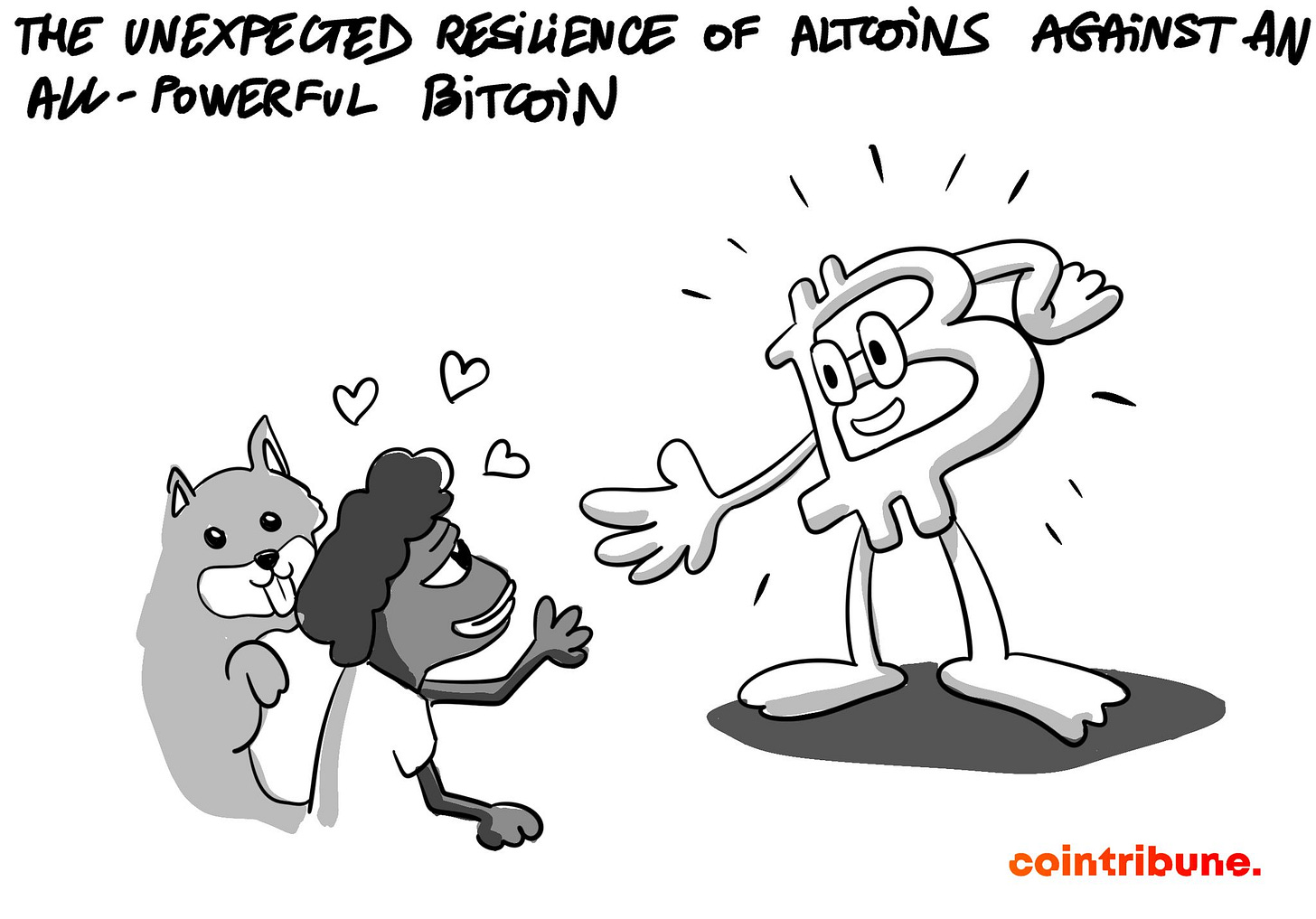💼Bitcoin: El Salvador skillfully bypasses IMF restrictions
Welcome to the Daily Tribune for Tuesday, April 29, 2025 ☕️
Hello Cointribe! 🚀
Today is Tuesday, April 29, 2025, and as every day from Tuesday to Saturday, we summarize the news of the last 24 hours you shouldn’t miss!
But first…
✍️ Cartoon of the day:
A quick look at the market…
🌡️ Temperature:
Partly sunny 🌤️
24h crypto recap! ⏱
🇸🇻 El Salvador continues to accumulate Bitcoin without violating the IMF agreement
The Salvadoran government continues its Bitcoin purchases via its strategic fund, while respecting commitments made with the IMF, notably by limiting the public sector’s exposure.
📊 The unexpected resilience of altcoins against a mighty Bitcoin
Despite Bitcoin's dominance, the altcoins' market capitalization reaches 1.05 trillion dollars in 2025, supported by targeted investment strategies and growing adoption.
⚙️ The Ethereum community proposes a fee reform to revive its ecosystem
Ethereum developers suggest a new fee structure aimed at supporting small projects and strengthening the network's competitiveness against competitors such as Solana.
🇧🇷 Historic launch of an XRP ETF in Brazil
Hashdex introduces the first XRP ETF on the B3, the main Brazilian stock exchange, offering investors regulated access to this cryptocurrency.
Crypto of the day: Nervos Network (CKB)
Nervos Network is a modular public blockchain based on a dual-layer architecture. The base layer, called Common Knowledge Base (CKB), uses a Proof-of-Work (PoW) consensus mechanism to ensure network security and decentralization. This design separates data storage from transaction computation, thus offering greater flexibility and scalability.
The native token CKByte (CKB) is used to pay transaction fees, store data on the blockchain, and incentivize miners to secure the network. Each CKB allows storing a certain amount of data, making it a unit of measure for network resource usage. The initial token distribution occurred at the mainnet launch in November 2019, with a total supply planned at 47.15 billion CKB.
Recent performance:
Current price: $0.0052 USD
24-hour change: +3.05%
Market capitalization: about 243 million dollars
Rank on CoinMarketCap: #177
Bitcoin targets 50 trillion dollars in capitalization!
Bitcoin no longer limits itself to being an "alternative store of value" or the "digital gold" of the 21st century. According to Hunter Horsley, CEO of Bitwise, it is destined to redefine the global monetary order. His vision? A Bitcoin reaching a capitalization of 50 trillion dollars, eclipsing not only gold but also the US sovereign bond market.
From digital gold status to a pillar of the global monetary system
Today, gold weighs about 23 trillion dollars in capitalization. Bitcoin, still far behind, is nevertheless seen by Bitwise as the future replacement for traditional safe-haven assets.
Hunter Horsley estimates that, in a context of increasing instability and distrust toward the dollar, Bitcoin could capture investment flows currently directed toward Treasury bonds and national monetary reserves — a colossal market nearly 50 trillion dollars.
This paradigm shift would be based on two dynamics:
Bitcoin’s algorithmic scarcity (supply capped at 21 million units).
Its growing institutional adoption, now impossible to ignore.
Bitcoin, new macroeconomic asset?
Bitcoin is no longer seen as an isolated speculative asset. It now reacts to global liquidity cycles — on par with major currencies or sovereign debts.
The dynamic is already underway: Bitwise’s BITB ETF holds more than 39,000 BTC, valued at nearly 3.7 billion dollars. Many other institutional funds are following this trajectory. Bitwise's thesis is clear: Bitcoin is quickly institutionalizing, and its capitalization could explode far beyond traditional projections.
The hypothesis of a Bitcoin at 50 trillion dollars is not just an optimistic forecast, it reflects a profound transformation: that of a global economy seeking new foundations of trust. At a time when major traditional currencies falter under the weight of sovereign debts and monetary inflation, Bitcoin imposes a radical alternative: a store of value belonging to no state, verifiable by all, manipulable by none.









